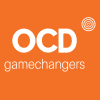Do you know what it’s like to grow up with a nagging feeling that something is fundamentally wrong? Maybe not with you, maybe not with the world, or maybe with both. I knew from a young age that my experience was not like the experience of the rest of my friends and family, but I didn’t know why.
The first time I felt that something was off was when I was about eight years old. I had to deal with major life events for the first time as my family was moving and my baby brother was born. I didn’t know how to cope with this stress and fear of change, and I began to develop odd visions, thoughts, and habits- later identified to be obsessive-compulsive disorder. I tried to provide reassurance for myself or stop the inevitable from happening in diary entries and extremely skewed pros and cons lists. I began to get the nagging feeling that someone was always following me, so much so that I felt the need to run up and down stairs so that no one would catch me. I had the belief that if I slept on the side of my bed that faced away from my religious night light that I was “choosing the devil”- I lived in fear of “the other side”, something that my family lovingly poked fun at for years. Perhaps the strangest of all were the intrusive images of pop singer Michael Jackson at the time of his death, or the images of E. T. living in my basement. These were all dismissed as an overactive imagination.
It wasn’t until my junior year of high school that I finally received an official OCD diagnosis. I experienced severe physical panic attacks, alerting those close to me of an underlying issue that needed to be attended to. I was able to book a therapy session and managed my mental health crisis in about a year, though I will live with OCD for the rest of my life. I remember initially feeling confused when my therapist told me that I had OCD- I’m not particularly neat or perfectionistic. She explained that OCD is made up of two parts; intrusive images or thoughts (obsessions) and behaviors done to try and get the anxiety to go away (compulsions). I realized that I’d had this disorder my entire life, but never quite had a name for it. It is always shocking to find out that you have a mental illness, but it was very liberating for me to be able to give a name to what was making me feel inherently and fundamentally different from other people. I found support through therapy and online communities, and through the OCD Gamechangers Young Adult Committee. Though OCD is different for everyone, I found people who could relate to me. The most devastating part of any mental illness is the feeling that you are completely alone and helpless. I felt like that for a long time before my diagnosis, and it exacerbated my anxiety and depression. This feeling of hopelessness and spiraling can lead many people to thoughts of self-harm or even suicide. Had I known what OCD was a lot sooner, I feel that I may have been able to avoid or lessen some of my severe anxiety in my teen years. This is the reason why I became an advocate for OCD. Proper support and an early diagnosis when I first noticed OCD symptoms as a child would have saved me a lot of time, though I am thankful for the time I do have and I am thankful for the fact that I received a diagnosis at all. It’s critical to seek mental health care if you feel you may need it, and to encourage others to do the same. Education and care will lead to an increase in diagnoses and treatment, and a decrease in stigma. After a lifetime of feeling like my experience was inherently wrong, my diagnosis was extremely liberating and validating.

